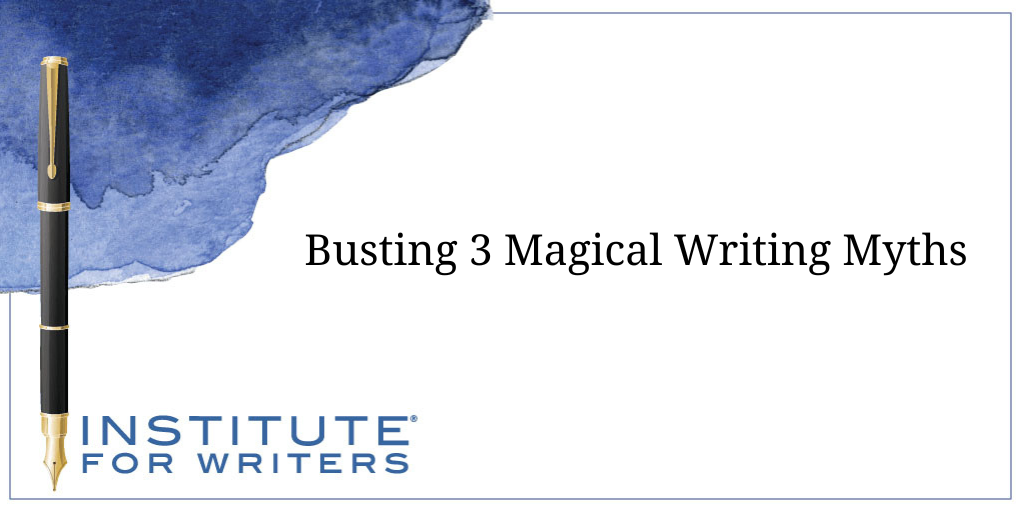
10 Plot Pitfalls to Think About
Plot can be tricky, and, as a writer, you need to be aware of what makes or breaks plot. Take a look at 10 different things to avoid in your own writing.

Any activity with an artistic element tends to gather a certain amount of magical mythology. Art seems like magic to people who sort creative pursuits into categories based on practical versus artistic. As a result, artistic activities are reserved for those with “talent” and anyone without this elusive talent element are assumed to be excluded from the activity.
 Talent does exist but is difficult to define. I tend to think of it as “ease of learning.” When you have talent in any area, it takes you less effort to learn (and especially to learn the beginning skills) than it does someone without talent. Both of you will be able to learn, but the person with talent will learn with more ease. Because of that, people who are recognized as having talent in a specific area because of their early successful attempts at creation tend to be encouraged more than those without this ease of learning. This, however, can lead to myths that stand in the way of success.
Talent does exist but is difficult to define. I tend to think of it as “ease of learning.” When you have talent in any area, it takes you less effort to learn (and especially to learn the beginning skills) than it does someone without talent. Both of you will be able to learn, but the person with talent will learn with more ease. Because of that, people who are recognized as having talent in a specific area because of their early successful attempts at creation tend to be encouraged more than those without this ease of learning. This, however, can lead to myths that stand in the way of success.
Let’s bust three of the magical writing myths today.
Years ago, I wrote a picture book. The book had some issues, but I liked it so I looked into how one got a picture book published. Picture books aren’t my field. I wasn’t writing them, and I didn’t know much about them. I had been reading a lot of them because I recognized this wasn’t an area in which I was well versed.
 Then I wrote one. I was able to get an agent, and he sent the book to publishers. None of the publishers bought it, but—without exception—they said I had “talent.” That amounted to saying “she has some writing skill.” Talent didn’t make the book sell. Talent didn’t even make the book good. It simply allowed me to write something that was interesting even though it was also a beginner effort.
Then I wrote one. I was able to get an agent, and he sent the book to publishers. None of the publishers bought it, but—without exception—they said I had “talent.” That amounted to saying “she has some writing skill.” Talent didn’t make the book sell. Talent didn’t even make the book good. It simply allowed me to write something that was interesting even though it was also a beginner effort.
If writers are seduced by those early compliments about talent, it can lead to jumping the gun on submissions. If you were one of those kids whose teachers said you had writing talent, and whose friends said the same, you might think you can write something publishable right off the bat. And when you don’t manage to sell something right away, it can lead to grumpy remarks about editors not recognizing talent or this being an industry that doesn’t care about talent. When you have talent and the talent isn’t rewarded, it can be tempting to assume it’s the system that is broken.
Because talent means you have some skill in the craft of writing, yes, this industry definitely cares about talent. But if you take that initial talent and don’t build on it with practice, and enough humility to be teachable, you’re going to lose out every time to the writer who simply works really, really hard—even if that hard-working writer hasn’t been recognized at having this elusive talent. Talent plus hard work will take you far, but if you only get to have one of the two, shoot for the hard work, because that will get you where you want to go.
I’ve seen this particular writing myth far too frequently. It’s often used by self-published authors who do not hire an editor to help them clean up their writing and bring it up to publication level. It’s a comforting myth. If readers don’t care about the things you didn’t bother doing, then not doing them was a good idea, right? Right?
 The other time I see this one is when writers receive feedback that suggests they still have a lot of work to do on their writing skills. Again, if readers don’t care, why do the work? One of the problems with any decision you make to avoid work is that it forces you to make excuses for an inferior end result.
The other time I see this one is when writers receive feedback that suggests they still have a lot of work to do on their writing skills. Again, if readers don’t care, why do the work? One of the problems with any decision you make to avoid work is that it forces you to make excuses for an inferior end result.
Writing is work. It can be enjoyable and exciting, but it’s also work. And it’s work worth doing. If a story is worth telling, it’s worth telling well.
Also, readers do care about grammar and typos. They may read over some mistakes, but every mistake they don’t read over will jerk them out of the story and make the reading less enjoyable. The reader may get back in and ultimately love the story. But they also might not. Being jerked out of the flow of the story allows the reader to think about the other things vying for attention. And once you lose a reader to “other things,” you run the risk of not getting that reader back.
A matching writing myth to this one is that because professionally published books can also include grammar mistakes and typos, that’s proof those mistakes don’t matter or that being published by an established company is exactly the same as self-publishing. Most established publishers can tell you that when they miss things and allow mistakes to creep in, they get mail from readers scolding them for allowing it. And if it bothers a reader enough to make that reader send mail about it, it’s a problem.
So make the effort to learn the correct grammar and use it. And if you struggle to find all your typos, enlist the help of a detail-oriented friend or family member to help you track them down. It’ll be worth the work because it really does matter.
I’ve heard writers talk about things like inspiration or finding their “muse,” with the related belief being that writing that flows easily is somehow superior writing. Some writers won’t even write at all unless they can be “in the zone.”
Most writers can cite moments when they were “in the zone” and the writing flowed more easily than usual. It’s an enjoyable place to be, but the writing that comes from it isn’t automatically superior to the writing by the same writer that had to be dragged from the writer’s brain, kicking and screaming.
 Writing can flow or it can be hard going, but one thing is sure, it’s going to take revision and effort to move it from okay to “good.” No one simply pours out brilliance. Writers with lots of experience may automatically write better than those who haven’t been writing long and haven’t worked on their prose, but one thing experienced writers know is that there will always be value in revision, polish, and work.
Writing can flow or it can be hard going, but one thing is sure, it’s going to take revision and effort to move it from okay to “good.” No one simply pours out brilliance. Writers with lots of experience may automatically write better than those who haven’t been writing long and haven’t worked on their prose, but one thing experienced writers know is that there will always be value in revision, polish, and work.
A belief that only easy writing is good tends to lead to problems creating when there is no flow and the words come in dribbles. Most of the time, writing isn’t easy. It’s a challenge. I find it an enjoyable challenge, but it’s a challenge. When a writer waits for that inspiration, that flow, and won’t write without it, it flings open the door to writer’s block, doubt, and frustration. And it rewards procrastination. And procrastination really doesn’t need rewarding. Procrastination exists just fine without it.
This is one of the reasons so many writers set aside specific writing time and force themselves to write whether it’s easy or hard. By showing up to do the work of writing, you help prevent writer’s block because you simply write anyway.
Writer’s block is often a response to fear, and it quickly becomes self-feeding. You’re scared so the words don’t come easily, so you don’t write because you think you’re supposed to wait for inspiration, and you get scared that it’s never going to be easy and the fear strengthens the block.
If instead you simply write, good writing, bad writing, writing on a work in progress, or writing on a silly exercise you found in a book or a blog post, then the writer’s block doesn’t stand a chance, because it isn’t being in fed on your fear. You don’t strengthen it with inaction. You don’t reinforce it with false beliefs about how flow is a sign of inspiration or value.
You simply write.
And through the writing, you become a better writer.
And through the work, the writing gets good. Because that’s really how writing works.
When a great idea blooms in your head, or when the writing flows, it’s easy to start letting magical thinking creep in about your writing. It can even be fun. But it brings along too many harmful myths, so I recommend staying in the real world. You’ll be glad you did.
With over 100 books in publication, Jan Fields writes both chapter books for children and mystery novels for adults. She’s also known for a variety of experiences teaching writing, from one session SCBWI events to lengthier Highlights Foundation workshops to these blog posts for the Institute of Children’s Literature. As a former ICL instructor, Jan enjoys equipping writers for success in whatever way she can.

Plot can be tricky, and, as a writer, you need to be aware of what makes or breaks plot. Take a look at 10 different things to avoid in your own writing.

Plot is more than just the chain of events within a story. There are so many elements to plot to consider when writing. Let’s dive into those elements.

Visiting new places is key to exploring new ideas and finding inspiration. Let’s see the places you can go this summer to spark your next story.
1000 N. West Street #1200, Wilmington, DE 19801
© 2024 Direct Learning Systems, Inc. All rights reserved.
1000 N. West Street #1200, Wilmington, DE 19801
© 2025 Direct Learning Systems, Inc. All rights reserved.
1000 N. West Street #1200, Wilmington, DE 19801
©2025 Direct Learning Systems, Inc. All rights reserved. Privacy Policy.